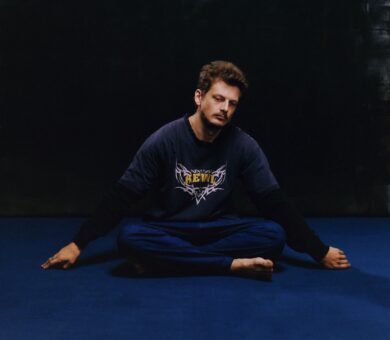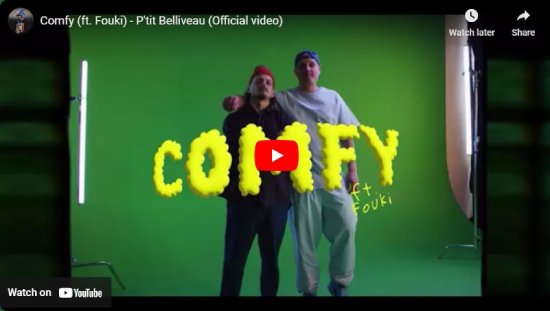In 2019, Jonah Guimond put his career as a construction worker in Nova Scotia on hiatus and headed to Montréal as a contestant in the finals of the Francouvertes, under the stage name P’tit Belliveau. After that, record contract in hand, he conquered Québec and the Atlantic provinces with his first two albums. Five years later, he’s chosen an independent path, and has become a proud artist-entrepreneur – now returning to his audience with a third offering, simply titled P’tit Belliveau.
 “I can’t tell all about my decision to leave my record label, but what I can tell you about being an independent is that from now on, when there’s a big decision to be made, I don’t overthink it, I just make it,” says Guimond.
“I can’t tell all about my decision to leave my record label, but what I can tell you about being an independent is that from now on, when there’s a big decision to be made, I don’t overthink it, I just make it,” says Guimond.
The Nova Scotian has always been largely involved in every step of his album production, so this new modus operandi isn’t unfamiliar. “I’ve always designed my album covers, and I was always there for the production decisions,” he says. “I still have a small team that I’ve chosen myself, and decisions get made a lot faster, allowing me to be spontaneous.”
With that, Guimond is now part of the cohort of musicians who, since February of 2024, are members of the newly re-imagined Société professionnelle des auteurs et compositeurs du Québec et artistes-entrepreneurs (SPACQ-AE).
“I don’t ask myself a lot of questions about what it means to be independent. I’m just living it as I go,” he says. He finds the most interesting and stimulating thing is to decide what to handle himself, and what to delegate. “I love doing bookings, for example, so I take care of that myself,” says Guimond. “I love negotiating and tour logistics. My case is unique, though. My band lives in Acadie, we come from far away. It’s a big ask to entrust someone from Montréal to take care of our bookings. It’s quite a puzzle.”
And since his musical project is no longer under development, he’s rarely trying to convince anyone that said project is worth a shot when he’s negotiating a booking, which makes things a lot simpler.
“It’s not actual booking inasmuch as the venues I talk to are happy to hear from me, and all we need to agree on is a price,” he says. “I wouldn’t have done that myself early in my career.” He doesn’t think independence will mean more money, but he does notice that “money can be more readily available for stuff we really want. There are parts of the job that I feel almost as passionate about as I do about music itself. You have to love administration as much as music to make the most out of it,” he says. “If you just want to do music, don’t be an independent. You’ll be unhappy.”
The Calculated Importance of Life Choices
Guimond took two days off of his construction job to participate in the Francouvertes contest in 2019. “I was so far removed from the world I live in now. It’s as if I took a couple of days off from my life as a musician to become an astronaut,” he says with a chuckle.
Becoming a construction entrepreneur was part of his plan, back then, with an eye on acquiring more freedom and to not have to work as hard. “Also, if you came to visit Baie-Sainte-Marie, where I live, you’d understand that people do everything themselves because there are no businesses doing what you need done, most of the time,” says Guimond. “There’s a hardware store, and a grocery store, so that forces us to have a solid DIY mentality – that’s crucial, now that I’m in charge of my own musical project.”
P’tit Belliveau has long believed that the key to a career in music is live shows. “We create a lot of stress for ourselves, trying to imagine a world where we sell vinyl and CDs, and where Spotify pays better,” he says. “I stopped thinking about that a long time ago. I simply think the actual business is live shows. Selling T-shirts is the second-biggest part of the industry. The rest are puny little bonuses.”
That’s why, out of respect for the audience that sell out the venues he plays, he insists on playing all the songs that took him where he is today. “We do play the newer material,” he explains. “We still want to have some space for improv, unexpected twists and turns, and some randomness. But at the end of the day, it’s just a rock show, with a bit of fun secret stuff.” If a joke is told on the spur of the moment and the reaction is good, it then becomes part of the next show. It’s always a work in progress.
He knows what building means and he’s been building for a long time. “You know, my previous job was building houses,” he says. “When you stand in front of a house you built ten years ago, and it’s still standing, you know you’ve done a good job. It’s the same for us: we’ve worked hard to get sold-out venues, and that’s also what motivates us to do our job properly.”
Starting at the End

Select the image to play the YouTube video of the P’tit Belliveau song ” P’t’être qu’il a du tequila dans la brain”
P’tit Belliveau’s debut album was 2020’s Greatest Hits Vol. 1. He’s since released Un homme et son piano (2022), and now his self-titled LP on April 26, 2024. One would be forgiven for saying that Guimond is hard-headed, and likes doing things backwards.
“I know releasing an album titled P’tit Belliveau is more of a debut album thing, but then again, I do believe my first album is a lot of my fans’ favourite album forever, no matter what, so it makes sense that it was my Greatest Hits,” he explains.
With the new LP’s frog-centric, fuchsia-coloured cover, Guimond feels he’s finally giving us an album that truly represents who he is, and through which he finally fully understands his project. “It’s almost like a new beginning, a new chapter in a new book,” he says. “I think I felt I needed to establish some limits before I came out with this. If I’d started with my frog album, people would’ve found that too vast and eclectic.” He does, however, feel he can crank the crazy up even more from now on. “I was stuck in a cage for a long time,” he confides. “I’ve tried to get rid of the cage, but I’m not totally ready yet.”
The “pop” label is the one he chooses to describe his new oeuvre globally, “because pop is not as much a sound as it is a mentality,” he believes. “People may use pop cynically, and say it’s all about being common-denominator, and trying to dumb it down for everyone. But to me, the concept of pop is not about trying to be accessible, but about trying not to be inaccessible.”
“Le vent du nord est fort, mais point plus fort que moi” [freely: “The North Wind is strong, but never as strong as me”], he poetically sings on “L’église de St. Bernard.” “I think it’s my favourite because it’s very much like how I would write songs in the beginning, in my car, driving home from work,” says Guimond. “I didn’t sit down to write, I just sang in my car.” A lot of his favourite songs are “zero deep,” and stop at the first layer. “We don’t realize how hard it is to write a song like that, a song that is simple and efficient,” he says.
Musically, he has a preference for the “frog trilogy”: “The Frog Swamp,” “The Secret Life of Frogs,” and “The Frog War.” “I see that as one big song, where I put on a lot of stuff that I didn’t allow myself to do on my previous albums,” he says.
Said frog is also featured on the album cover, a simple picture that Guimond took himself, above which frog is P’tit Belliveau’s death-metal logo: “I don’t know pourquoi,” he says. “It was just cool,” he giggles. “I snapped a picture of this frog in the pond at my place. With my logo, I thought it was maybe a tad too much, maybe a tad too stupid. Turns out that was exactly what I wanted.”
